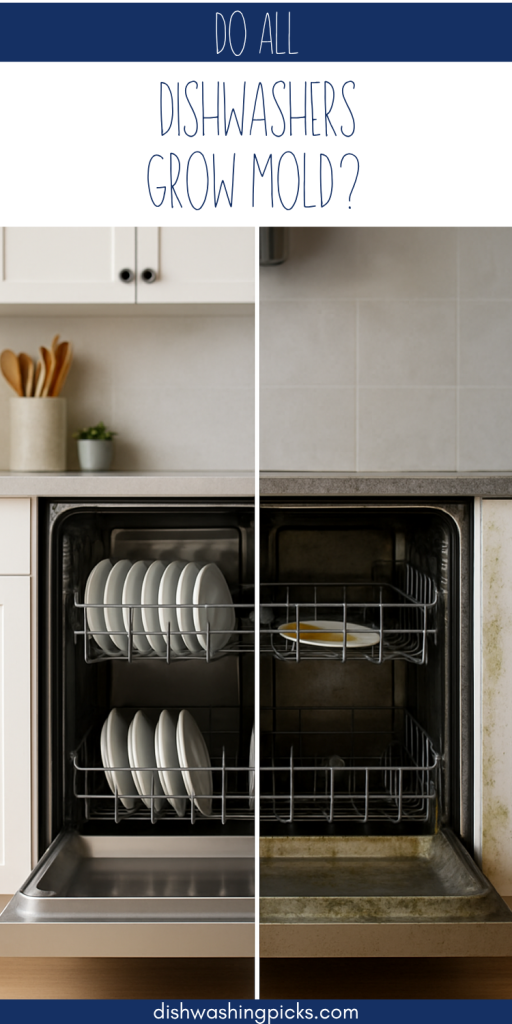
Let’s Be Real: Your Dishwasher Isn’t as Clean as You Think
Okay, pop quiz: What’s the one appliance in your kitchen that’s literally built to clean—but somehow ends up getting gross itself?
Yep. The dishwasher.
You’d think with all that hot water and soap sloshing around, mold wouldn’t stand a chance in there, right? Well… not exactly. If you’ve ever opened your dishwasher and been hit with a weird, musty smell—or spotted some fuzzy little guests lurking in corners—you already know what we’re talking about.
So, does every dishwasher grow mold eventually? Let’s unpack that.
Wait, Dishwashers Can Get Moldy? Seriously?
Oh, absolutely. And it’s not as rare as you’d think.
Dishwashers are warm, damp, and dark—aka the holy trinity for mold growth. Add in leftover food particles, soap scum, and hard water buildup? Boom. Mold party.
But here’s the good news: it’s not guaranteed to happen. Some dishwashers are more prone to mold than others—and a lot depends on how you use and maintain yours. (Spoiler alert: closing the door right after a cycle? Big no-no.)
Let’s break down why mold shows up in the first place and what you can do about it.
The Mold Recipe: Why It Happens
Mold loves three things:
- Moisture (Check. Dishwashers are full of it.)
- Organic material (Food bits? Yum.)
- Poor ventilation (Closed doors trap in the humidity.)
So if your dishwasher isn’t drying completely, or if you’re not scraping off food before loading dishes, you’re basically rolling out the red carpet for mold.
And here’s the kicker: new, high-efficiency dishwashers that use less water? They sometimes don’t dry as well, making it easier for moisture to linger. Irony, huh?
Do All Dishwashers Grow Mold?
Not all—but a whole lot of them can if you’re not careful.
Think of it like this: having a moldy dishwasher isn’t a sign of a bad brand. It’s more about what happens after the dishes are done. How often do you clean it? Do you leave the door cracked open after a cycle? Do you run it regularly?
Even top-tier models like Bosch or Miele aren’t immune if they’re neglected. Mold doesn’t care if your dishwasher costs $400 or $1400—it just wants a damp, cozy place to hang out.
What You Can Do (And What Most People Don’t)
Here’s the good stuff. Mold might be common, but it’s definitely beatable. Try these habits:
- Leave the door cracked open after each wash – Let that steam escape!
- Wipe down the rubber gasket (that seal around the door) – Mold loves hiding there.
- Run a monthly cleaning cycle – Some dishwashers even have a dedicated button for this.
- Use white vinegar or dishwasher cleaner tablets – Super simple and super effective.
- Scrape food, but don’t fully rinse – Believe it or not, detergent needs a bit of grime to do its job properly.
Imagine your dishwasher as a mini ecosystem. A few tweaks in your habits can turn it from a mold haven into a fresh, squeaky-clean machine.
So, Should You Be Worried?
Nah, don’t panic. Mold in dishwashers is more of a gross-but-fixable issue than a full-blown emergency.
If you spot it, clean it. If you smell it, air it out. And if you maintain it, chances are you’ll never have to deal with it again.
Just think of your dishwasher like you would your bathroom—both use water, both need the occasional deep clean, and both feel way better to use when they don’t smell like a wet towel that’s been sitting for a week.
Keep It Clean, Keep It Running
Mold doesn’t have to be part of your dishwasher’s story. With a little awareness and a few easy habits, you can keep things fresh and funky—in a good way.
So next time you open the door after a cycle, take a second. Does it smell clean? Or… a little swampy?
If it’s the latter, you know what to do.
